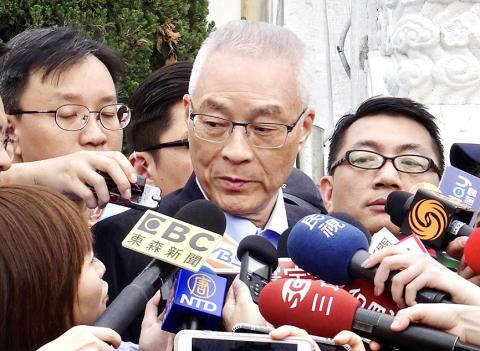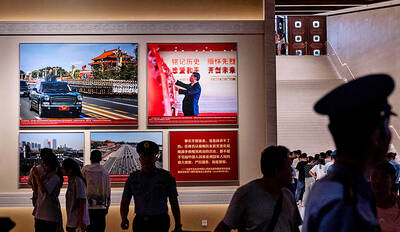Chinese Nationalist Party (KMT) Chairman Wu Den-yih (吳敦義) yesterday rejected former New Taipei City mayor Eric Chu’s (朱立倫) proposal that they meet in public tomorrow to discuss the party’s presidential primary between the two tomorrow.
Wu said that the meeting would touch upon issues that should not be made public.
Wu made the remarks on the sidelines of an event in Taipei in response to media queries after Chu — who has announced he would seek the party’s nomination for next year’s presidential race — on Thursday called for a public meeting.

Photo: Chien Jung-fong, Taipei Times
“There are not going to be any secrets, but it is inevitable that we might discuss the advantages of presidential hopefuls and areas they might need to pay particular attention to. These cannot be made public,” Wu said.
The arrangement is for Wu and Chu to exchange opinions and then they can face the media, Wu said, adding that planned meetings with Chou Hsi-wei (周錫瑋), a former commissioner of what was then Taipei County who has also announced a presidential bid, and Kaohsiung Mayor Han Kuo-yu (韓國瑜), who has been touted as a candidate, but has not entered the race, would be carried out in a similar manner.
“There will be no exceptions,” he said.
Wu is to meet with KMT Legislator Wang Jin-pyng (王金平), who is also seeking the KMT nomination, on Monday and Chou on Tuesday.
He was to meet with Han yesterday in a perceived attempt to persuade him to join the primary, but the meeting has been postponed by Han’s office and is likely to be held after the mayor’s return from a visit to the US this month.
KMT deputy spokeswoman Hung Yu-chien (洪于茜) yesterday said that the meetings are designed to allow Wu to exchange opinions with potential candidates on the party’s presidential primary and learn about their views.
KMT Vice Chairmen Tseng Yung-chuan (曾永權) and former Taipei mayor Hau Lung-bin (郝龍斌) are to be part of the Wu-Chu meeting, Hung said, adding that the KMT Culture and Communications Committee would hold a news conference afterward.

Three batches of banana sauce imported from the Philippines were intercepted at the border after they were found to contain the banned industrial dye Orange G, the Food and Drug Administration (FDA) said yesterday. From today through Sept. 2 next year, all seasoning sauces from the Philippines are to be subject to the FDA’s strictest border inspection, meaning 100 percent testing for illegal dyes before entry is allowed, it said in a statement. Orange G is an industrial coloring agent that is not permitted for food use in Taiwan or internationally, said Cheng Wei-chih (鄭維智), head of the FDA’s Northern Center for

The Chinese military has built landing bridge ships designed to expand its amphibious options for a potential assault on Taiwan, but their combat effectiveness is limited due to their high vulnerability, a defense expert said in an analysis published on Monday. Shen Ming-shih (沈明室), a research fellow at the Institute for National Defense and Security Research, said that the deployment of such vessels as part of the Chinese People’s Liberation Army (PLA) Navy’s East Sea Fleet signals a strong focus on Taiwan. However, the ships are highly vulnerable to precision strikes, which means they could be destroyed before they achieve their intended

About 4.2 million tourist arrivals were recorded in the first half of this year, a 10 percent increase from the same period last year, the Tourism Administration said yesterday. The growth continues to be consistent, with the fourth quarter of this year expected to be the peak in Taiwan, the agency said, adding that it plans to promote Taiwan overseas via partnerships and major events. From January to June, 9.14 million international departures were recorded from Taiwan, an 11 percent increase from the same period last year, with 3.3 million headed for Japan, 1.52 million for China and 832,962 to South Korea,

REWRITING HISTORY: China has been advocating a ‘correct’ interpretation of the victory over Japan that brings the CCP’s contributions to the forefront, an expert said An elderly Chinese war veteran’s shin still bears the mark of a bullet wound he sustained when fighting the Japanese as a teenager, a year before the end of World War II. Eighty years on, Li Jinshui’s scar remains as testimony to the bravery of Chinese troops in a conflict that killed millions of their people. However, the story behind China’s overthrow of the brutal Japanese occupation is deeply contested. Historians broadly agree that credit for victory lies primarily with the Chinese Nationalist Party (KMT)-led Republic of China (ROC) Army. Its leader, Chiang Kai-shek (蔣介石), fled to Taiwan in 1949 after losing a